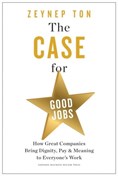- Managing people
Benefit from a Good Jobs Strategy
MIT’s Zeynep Ton’s new book shows how giving people ‘good jobs’ is better for business and how businesses should go about creating them
“If we want things to stay as they are, things will have to change.” Giuseppe Tomasi di Lampedusa, The Leopard.
For the capitalist system, that has so reduced global poverty and improved our lives over past decades, to face down its critics and survive and thrive, it needs to change. Its widespread reliance on low-paid, unreliable jobs that has fueled a crisis of inequality and a loss of faith in market economics needs to be reversed.
In 2020 a Pew Research Center study found that 70% of U.S. adults thought the capitalist system was unfair, favoring powerful interests at the expense of poorer people. Leaving aside the political implications of low pay and bad jobs—polarization to extremes of left and right—there are also obvious practical implications. Bad jobs lead to high staff turnover and low employee engagement. This was always bad for company performance, now, since the COVID-19 pandemic, staff shortages and recruitment have become serious issues in the U.S. and Europe.
Upskilling workers to better jobs can be important, but it won’t solve the bigger problem—the growing gap between the rich and poor and the shrinking middle class. The evidence is that most future jobs' growth is likely to come in low-wage sectors. Whereas white collar professional jobs are said to be vulnerable to AI enabled processes, jobs in caring, retail, hospitality, call centers, and healthcare are far less likely to be affected. The systemic change, “If we want things to stay as they are,” means offering a good living wage, reliable hours, and opportunities for growth and development to workers at all levels—especially at the bottom of the pyramid.
All this may sound like ‘pie-in-the-sky’. Zeynep Ton, Professor of Practice in Operations Management at MIT Sloan School of Management, has real-world data and experience with multiple large corporations to prove it is not. So convinced was she in the value of a ‘good jobs strategy’ over a ‘bad jobs strategy’, that along with MIT colleague, Sarah Kalloch, and ex-Rotman dean, Roger Martin, she set up the Good Jobs Institute in 2017. This not-for-profit has worked successfully with numerous organizations to redefine what it means to run a successful business based on the creation of good jobs.

Ton first laid out her thinking in 2014 in her book The Good Jobs Strategy. Since then, while she has been encouraged to find that senior corporate leaders almost all say they would like to offer better employment, too often they are daunted by the task and don’t know where to start. Her new book, The Case for Good Jobs: How Great Companies Bring Dignity, Pay and Meaning to Everyone’s Work, details the key components of a good jobs strategy and illustrates how to get it right, with reference to those businesses—like Costco, Four Seasons, and Mercadona—that have adopted it successfully.
Ton does not propose a standard playbook—as every company situation is different. However, a good jobs strategy always starts from the same premise: that low margins make it difficult to offer higher pay and better conditions, particularly if any benefits will take ages to materialize. But if you can raise pay and raise productivity simultaneously, with each unit of labour generating more, the problem can be solved.
Ton is adamant that her prescription is not limited to narrow HR/employee issues, but is fundamentally about better operations, about prioritizing customers to maximize employee motivation and contribution, about committing to customer-centric decision making over financial decision making. She argues that investing in people through training and remuneration must be combined with making the right operational choices, suggesting these four key operational choices: i) Focus and simplify; ii) Standardize and empower; iii) Cross-train; and iv) Operate with slack—choices her new book explains how to make work.
……………………………………………………………………………………………………………………..
MIT Sloan is uniquely positioned at the intersection of technology and business practice, and participants in our programs gain access to MIT’s distinctive blend of intellectual capital and practical, hands-on learning.
ARTICLES YOU MIGHT LIKE
RESEARCH
Harvard and BC University study values conversational receptiveness in our polarized times
DEVELOPING LEADERS QUARTERLY MAGAZINE AND WEEKLY BRIEFING EMAILS

































